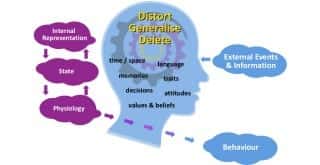The language we use from day to day impacts how we view and experience the world around us. Our minds look for information to back up and verify our ‘story’ of what is or is not. Our mind attempts to capture, process and use information to describe and help us make sense of what’s going on around us (and sometimes within our minds). Inevitably, things get lost in translation.
Those of you who have been following my blogs for a while may remember my blog about the NLP communication model – that shows our our mind generalises information based on a number of  things (such as past experience), it deletes information (because it can’t handle the millions bits of information coming into our neurology each second – it can cope with 7 bits plus or minus 2), or indeed it distorts the information (e.g. it morphs it in order to make it easier and faster to process – for example giving certain information, ideas or experiences more weight or focus than others).
things (such as past experience), it deletes information (because it can’t handle the millions bits of information coming into our neurology each second – it can cope with 7 bits plus or minus 2), or indeed it distorts the information (e.g. it morphs it in order to make it easier and faster to process – for example giving certain information, ideas or experiences more weight or focus than others).
How many of your thinking patterns are the same as yesterday?
Lots of research points to the fact that much of our thinking today is the same as yesterday. We often don’t stop to consider how helpful our thinking patterns are – they are almost like habits in many ways – well trodden patterns of thinking. We often get frustrated when our results don’t change, but fail to realise that until our thinking changes, what realistic change do we really think we have of changing our results? Often our thinking can provide useful pointers to what’s going on at a deeper level in our mind – potentially highlighting underlying beliefs about ourselves, others and the world, or indeed serve to highlight what we value most (what is important to us – regardless of if this helps us achieve our desired goals or not).
4 patterns of thinking you will want to change …
Consider the patterns of thinking below – do you do this? how helpful do you think it is? does it get you want you want/help you reach your goals? – or would you like to change it?
-
Overgeneralisation: Using words like always, never in relation to a single event or experience. Examples – ‘I’ll never get that promotion’ or ‘She always does that…’
-
Should’s/Must do/Have to: (in NLP we call these modal operators) this is where someone uses words that imply necessity in order to attempt to motivate themselves. Not very effective ist only leads to low motivation or even the feeling of guilt when you don’t follow through (or anger when others don’t follow through). Examples: ‘I should have got the paining done this weekend’ or ‘he ought to have be more aware of my feelings’
-
Labelling: in NLP we avoid doing this because it’s not helpful, particularly when it’s a negative label you apply either to yourself or others. The challenge is that the unconscious mind starts to live up to the label. This is one of the major reasons why you should avoid labelling children – e.g ‘you are dyslexic’ – the child unconscious mind starts to live up to that label. Other examples: ‘I’m such a wimp, I didn’t stand up to my colleagues’
- Discounting the Positive: You look for the negatives in a situation, action or experience. This is often because of beliefs you have (either about yourself or others, or indeed bout what you think the outcome might be – and in NLP we can change these, which is great news). Because of your belief you don’t see or acknowledge the positives, or perhaps insist your positive actions, qualifies and achievements don’t count. Examples: ‘that doesn’t count, anyone could have done that’
What now? How can NLP help?
Being aware of these patterns is the first step and understanding if you fall into these thinking traps. What you now need to do is decide if these thinking patterns are helpful (I guess like me you think they’re not useful) and therefore you need to decide what you’re going to do about it. Studying NLP allows us to learn how to change our thinking. Laura always says:
The solution to any problem is always in your thinking
If you’d like to change your thinking patterns so that they are supportive of your goals and no longer hold you back, then get in touch and book onto an NLP Practitioner Course or talk to us about NLP coaching.


